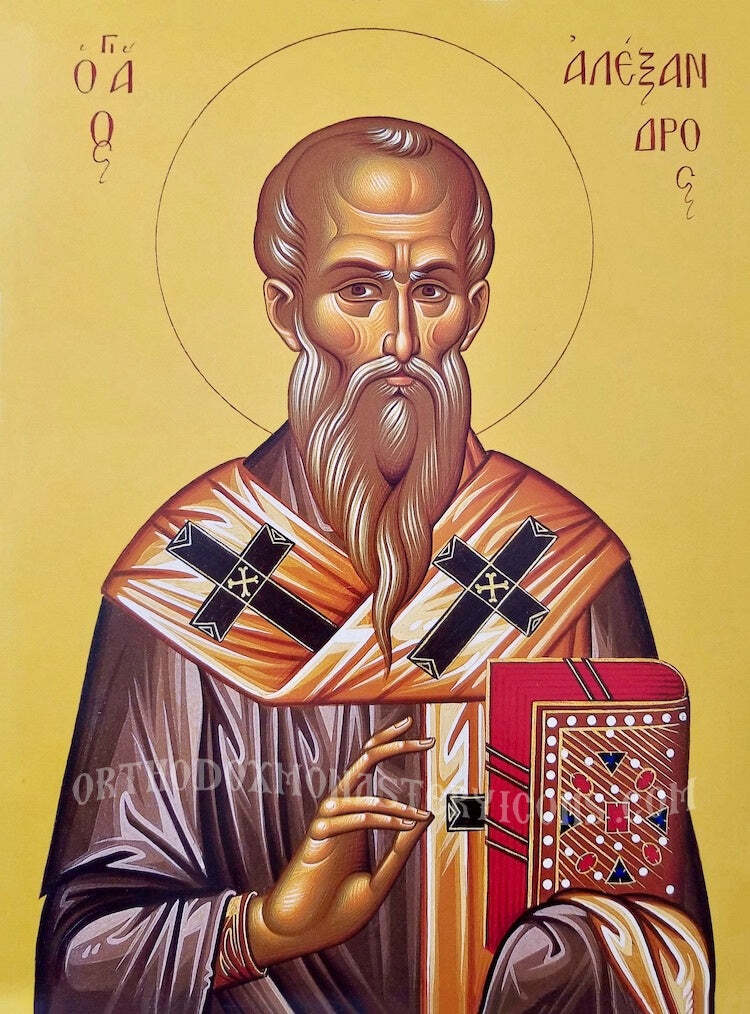Saints Alexander, John and Paul, Patriarchs of Constantinople, lived at different times, but each of them happened to clash with the activities of heretics who sought to distort the teachings of the Church. Saint Alexander (325-340) was a vicar bishop during the time of Saint Metrophanes, the first Patriarch of Constantinople.
Because of the patriarch’s extreme age, Alexander substituted for him at the First Ecumenical Synod at Nicea (325). Upon his death, Saint Metrophanes left instructions in his will to elect his vicar to the throne of Constantinople. During these times His Holiness Patriarch Alexander had to contend with the Arians and with pagans. Once, in a dispute with a pagan philosopher the saint said to him, “In the Name of our Lord Jesus Christ I command you to be quiet!” and the pagan suddenly became mute. When he gestured with signs to acknowledge his errors and affirm the correctness of the Christian teaching, then his speech returned to him and he believed in Christ together with many other pagan philosophers. The faithful rejoiced at this, glorifying God Who had given such power to His saint.
The heretic Arius was punished through the prayer of Saint Alexander. Arius had apparently agreed to enter into communion with the Orthodox. When the Emperor asked him if he believed as the Fathers of Nicea taught, he placed his hand upon his breast (where he had cunningly concealed beneath his clothes a document with his own false creed written upon it) and said, “This is what I believe!” Saint Constantine, unaware of the deceitful wickedness of Arius, set a day for receiving him into the Church. All night long Saint Alexander prayed, imploring the Lord not to permit this heretic to be received into communion with the Church.
In the morning, Arius set out triumphantly for the church, surrounded by imperial counselors and soldiers, but divine judgment overtook him. Stopping to take care of a physical necessity, his bowels burst forth and he perished in his own blood and filth, as did Judas (Acts 1:18).
His Holiness Patriarch Alexander, having toiled much, died in the year 340 at the age of 98. Saint Gregory the Theologian mentioned him afterwards in an encomium to the people of Constantinople.
Saint John IV the Faster, Patriarch of Constantinople (582-595), is famed in the Orthodox Church as the compiler of a penitential Nomokanon (i.e. rule for penances), which has come down to us in several distinct versions, but their foundation is one and the same. These are instructions for priests on how to hear the confession of secret sins, whether these sins have been committed, or are merely sins of intention.
Ancient Church rules address the manner and duration of public penances which were established for obvious and manifest sinners. But it was necessary to adapt these rules for the secret confession of things which were not evident. Saint John the Faster issued his penitential Nomokanon (or “Canonaria”), so that the confession of secret sins, unknown to the world, bore witness to the good disposition of the sinner and of his conscience in being reconciled to God, and so the saint reduced the penances of the ancient Fathers by half or more.
On the other hand, he set more exactly the character of the penances: severe fasting, daily performance of a set number of prostrations to the ground, the distribution of alms, etc. The length of penance is determined by the priest. The main purpose of the Nomocanon compiled by the holy Patriarch consists in assigning penances, not simply according to the seriousness of the sins, but according to the degree of repentance and the spiritual state of the person who confesses.
Among the Greeks, and later in the Russian Church, the rules of Saint John the Faster are honored on a level “with other saintly rules,” and the Nomocanons of his book are accounted “applicable for all the Orthodox Church.” Saint Νikόdēmos of the Holy Mountain included him in the Manual for Confession (Exomologitarion), first published in 1794, and in the Rudder (Pedalion), published in 1800.
Saint Paul, by birth a Cypriot, became Patriarch of Constantinople (780-784) during the reign of the Iconoclast Emperor Leo IV the Khazar (775-780), and was a virtuous and pious, but timid man. Seeing the martyrdom which the Orthodox endured for the holy icons, the saint concealed his Orthodoxy and associated with the iconoclasts.
After the death of the emperor Leo, he wanted to restore icon veneration but was not able to accomplish this, since the iconoclasts were still quite powerful. The saint realized that it was not in his power to guide the flock, and so he left the patriarchal throne and went secretly to the monastery of Saint Florus, where he took the schema.
He repented of his silence and association with the iconoclasts and spoke of the necessity for convening the Seventh Ecumenical Council to condemn the Iconoclast heresy. Upon his advice, Saint Tarasius was chosen to the patriarchal throne. At that time, he was a prominent imperial counselor. The saint died as a schemamonk in the year 804.
Apolytikion
O God of our Fathers, always act with kindness towards us; take not Your mercy from us, but guide our lives in peace through the prayers of the Patriarchs Alexander, John, and Paul.
Kontakion
Aflame with love for Christ, ye took His yoke upon yourselves; and since ye emulated well His life upon the earth, ye were also made partakers of His great glory. Now, O Fathers Alexander the divinely-wise, wondrous John, and glorious Paul, ye stand before His throne; wherefore, fervently intercede with Him to save our souls.
